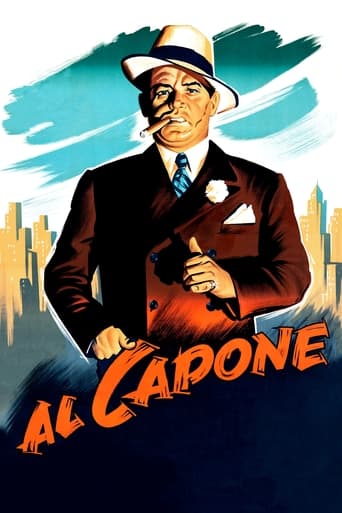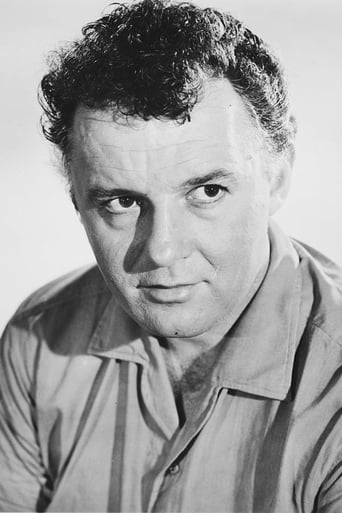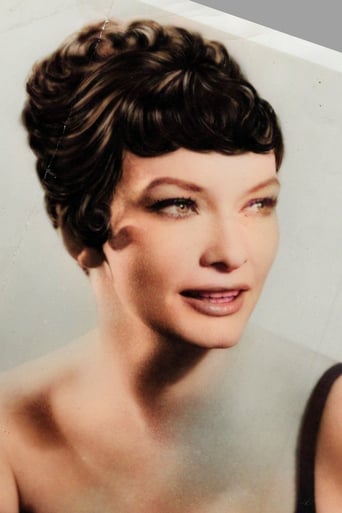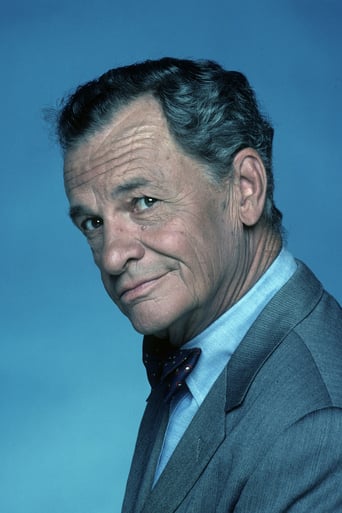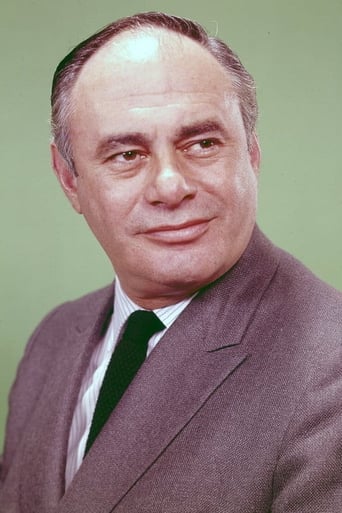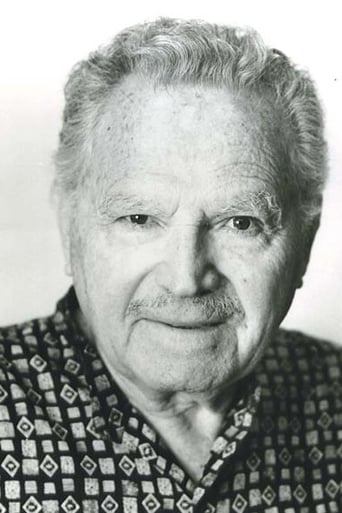Laikals
The greatest movie ever made..!
SunnyHello
Nice effects though.
ChanFamous
I wanted to like it more than I actually did... But much of the humor totally escaped me and I walked out only mildly impressed.
AudioFileZ
Here you have a very brutal and famous iconic criminal played by a very intense, almost overwhelming portrayal by Rod Steiger - who is definitely one of the all-time iconic movie "tough- guys". So, unless the writers drop the ball this should work and so it, mostly, does.By today's standards one might laugh at the depiction of the gang violence of Chicago in 1919. First, this was depicting a period in the twenties where outlaws had the advantage over law- enforcement, and, second, this is filmed with the technology and production values from a by- gone era. The viewer must keep in mind that the 20's Capone vs. O'Banion feud was between gangs not yet spilling over into the general populace, - even more jaw-dropping was Capone's rackets of virtually running city hall and skimming from the legitimate businesses of Chicago. This was achieved with a violet campaign of bombs with a body count. One that in modern times we can't wrap our heads around as to how in any time one criminal could freely do such. Well, he did and what you see isn't really such a poor representation as the point is made with what could be just graphic enough yet palatable for consumption per period norms. If anything it does depict it topically though ham-strung with the necessary sanitizing for 1950's audiences. Capone, the film, gets a pass here because it humbly, yet effectively, shows Capone as extremely violent with much charisma as only a psychopath combines.Now, seriously,what makes this film quite good? The fact it really did happen looms large, Capone was a unique man at a unique place at a unique time; creating the so-called "perfect storm", an overused, but accurate cliché' here. This is to be kept in mind as this film needed to be made.Though NYC's mob Coss Nostra would rule in similar fashion years later, however, no one ever controlled a town so completely and with the impunity of Al Capone. He was on a scale that belies rational comprehension. The writers have effectively had to tread lightly and still push this into the viewer's psyche. I think they've just barely managed it sans the luxury of the tremendous graphic violence and language of more modern films. Sure they've glossed over much, but they've got Steiger and he really brings Capone to life. Steiger's like DaVinci as he paints Capone with his physical presence, amazing expressions, animated delivery of harshly direct dialog, and ebbs and flows of anger. This is, perhaps, the definitive mob psychopath with, at least early on unlimited power. So, no Steiger doesn't "over act " or slip into uncontrolled melodrama. He's "spot on" one might say. It's a performance that stands tall and no matter how many times Capone's life is re-ran this will absolutely stand as the definitive celluloid Al Capone. That's how good Steiger is and he makes a movie that could rate a 5 or 6 into a 7.5.In the must see crime/gangster flicks there's, of course, The Godfather, then Scarface, and right behind that comes Capone before Bonnie and Clyde I'd humbly submit. Gotta see this one.
LeonLouisRicci
The years have not been kind to this flat 50's style recreation of 20's style gangsterism. The film is overwhelmed by Rod Steiger's performance and underwhelmed by the stiff conventionalism of the era's film making. The roaring 20's presented in the repressed 50's where decadence is bad table manners and spouting, yelling, and mumbling display an uneducated ignorance. Everything in this movie is tame where it should be wild and soft where it should be coarse.Historically Hollywood never did quite get it right, to be kind, and not even until very recently has the true ugliness and understanding of the unfairly glamorized criminal been portrayed for the destructive force that it is. Even so, even today, entertainment usually supersedes responsibility, but not because of community standards and motion picture code restraint.
mlraymond
I must begin by saying that few people today will ever know what the real Al Capone was like, though there are many excellent biographies of him available. What Rod Steiger does , along with the screen writers Wald and Greenberg, is to create a believable character, who we accept as the genuine Capone. From the moment he first saunters into a Chicago speakeasy on the eve of Prohibition to accept a job as bouncer, to the SPOILERS AHEAD: hard and dangerous life of a a convict at Alcatraz prison, he is utterly convincing. Steiger captures a vivid, larger than life portrayal of a criminal who is by turns funny, charming, brutal, truly frightening, and very aware of himself as a showman for the public. The scenes in which Capone makes self glorifying speeches about being a mere businessman and a public benefactor are quite faithful to the real Al Capone's frequent public comments on the subject. The rest of the cast is made up of good actors who give excellent performances. The gravelly voiced Murvyn Vye is hilarious as glum, humorless Bugs Moran, with a clever performance within a performance by Robert Gist, whose ruthless gangster Dion O'Banion plays the role of lovable Irishman to fool people into thinking he's not really dangerous. Nehemiah Persoff is a standout in the role of Capone's mentor Johnny Torrio, and James Gregory is good as the hardboiled police detective Schaefer who narrates the film. Martin Balsam is excellent as the corrupt reporter who acts as a go-between for Capone and legitimate society . His expression of wounded innocence when berated by the detective for being just a crook himself is marvelous. The strongest praise, aside from that due to Steiger, goes to Fay Spain for her incredibly powerful portrayal of a gangland widow romanced by Capone. She is nothing short of electrifying in the scene in which she, half laughing, half screaming, denounces Capone for his smiling attempt to compensate her for the death of her husband by offering to pay for the funeral. This scene alone is worth watching the entire movie for. The Twenties settings and characters are well done, and a surprising amount of real history is reenacted. Some is necessarily speculation about exactly how a murder was planned or who carried it out, but the story always has the feeling of being pretty much as it would have been. The only weakness I see in an otherwise solid production is the preachy narration by the detective character, but it does provide a sense of logical story development and a historical perspective. For anyone interested in seeing another of Steiger's amazing gallery of characters, and all fans of gangster movies, this is well worth seeing.
telegonus
This 1959 picture is yet another cinematic retelling of the life of mobster Al Capone, and is better than most I've seen. Rod Steiger as Big Al seems miscast at first but wins me over in the end. Steiger was a born ham, but a fine actor for all his Methodish mannerisms, and has moments in the movie in which he's almost hypnotically effective. Yes, it's a performance, I kept on telling myself, but so was Capone himself. Over the top, perhaps, but Capone was himself more than a little touched, and Steiger nails this aspect of Capone to perfection, and is more effective in capturing the big guy's capriciousness than Robinson or Muni before him. Steiger's Capone isn't merely a gangster, he's a man possessed. Director Richard Wilson's keeps this fairly modestly budgeted film moving at a fast pace, and it's never boring. In supporting roles, Fay Spain, Martin Balasm, James Gregory and Nehemiah Persoff are all effective. The black and white of this film evokes the late fifties more than the roaring twenties, and the movie at times feels a little like an episode of The Untouchables, at other times like Some Like It Hot. The Jazz Age was itself hot as the Eisenhower era was drawing to a close. F. Scott Fitzgerald's novels were coming back into vogue. O'Neill revivals on and off-Broadway were becoming commonplace. Al Capone captures this nostalgic mood, but really makes me nostalgic for the fifties more than for the twenties, for a time when fairly recent history could still be viewed as larger than life, the stuff of serious art and contemplation, not just fashionable nostalgia. Al Capone the movie is more nostalgia than serious art, but it touches on important issues, concerning violence, friendship, the role of government and the press as they pertain to and often collude with the criminal element, that still resonate today.
